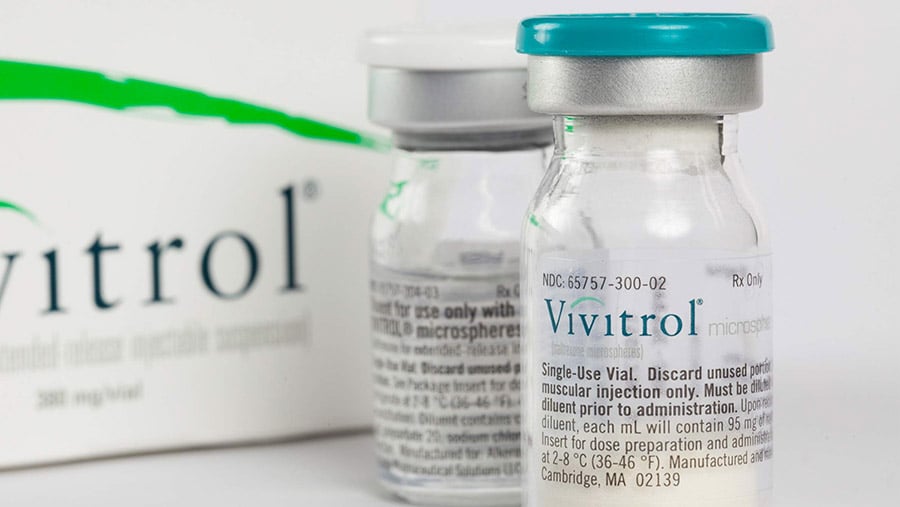Vivitrol and Alcohol
Alcohol use disorder (AUD) or alcoholism is one of the most common forms of substance abuse in the United States. Alcohol is legal and easily accessible. Making the chances of developing an alcohol addiction much more likely compared to other illegal substances. Through research and evidence-based treatments, Vivitrol has been seen to make a significant impact on treating and curbing alcohol cravings. Vivitrol is a medication often used for the treatment of alcohol use disorder. Oftentimes behavioral health programs such as drug and alcohol treatment facilities, offer Vivitrol as a form of MAT to help their clients throughout their rehab stay. Despite the success of the medication, using Vivitrol and alcohol simultaneously does not produce results in helping AUD.

What is Vivitrol?
Vivitrol is a brand name FDA-approved medication for the treatment of alcohol use disorders as well as opioid use disorders. Vivitrol consists of the active ingredient naltrexone. Vivitrol is available in an injection form, while naltrexone is available in tablet form. According to studies from the National Institute on Drug Abuse (NIDA), monthly Vivitrol injections are just as effective as a daily pill of naloxone when used as part of alcohol use disorder treatment. Both medications are effective in helping to ease the discomforts of alcohol and opioid withdrawal symptoms.
Naltrexone is an opioid antagonist. It works by blocking opioid receptors that control reward-based feelings, such as pain relief, in the brain. This affects the feelings of the desire to drink and can limit alcohol’s ability to reach that reward center in the brain. Ultimately, Vivitrol is used to block the euphoric and sedative effects of alcohol and reduce or suppress cravings to drink alcohol.
Vivitrol is normally given under the supervision and care of a medical physician or clinician. While the naltrexone tablets must be taken every day to be effective, the Vivitrol injections can be given once a month. These treatments can last anywhere from 3 to 4 months.
Check Your Insurance Coverage for FREE
Find out if your insurance covers addiction treatment in minutes. We accept most insurance!
Side effects of Vivitrol injections include:
- Headache and dizziness
- Nausea
- Fainting and fatigue
- Stomach pain
- Chest pain
- Muscle cramps and joint pain
- Flu like symptoms
- Liver damage
- Drowsiness
- Insomnia
- Decreased appetite
- Anxiety
How do I know if I have an Alcohol Addiction?
Vivitrol is commonly used as a part of alcohol detox treatments such as MAT and other forms of medication management. During this stage in rehab, clients are very susceptible to alcohol cravings and relapse. Completely removing alcohol from the system is an essential step in treatment. How do I know if I have an alcohol addiction? The DSM-5 defines alcohol use disorder (AUD) as meeting two or more of the following conditions listed below.
- Having to drink more alcohol in order to feel the same effects
- Experiencing withdrawal symptoms after the alcohol effects fade
- Drinking more or for longer than you wanted
- Wanting to drink less or stop but are unable to
- Spending a lot of time drinking or being sick from drinking too much
- Not doing things you once enjoyed in order to drink
- Continuing to drink even if it makes you depressed, causes other health problems or causes you to black out
Reach out to Hotel California by the Sea
We specialize in treating addiction and other co-occurring disorders, such as PTSD. Our Admissions specialists are available to walk you through the best options for treating your addiction.
Vivitrol and Alcohol Treatment
It is not recommended to take Vivitrol while continuing to consume alcohol. It can cause counterproductive effects and even cause further damage to the liver. Excessive alcohol consumption is known to cause significant damage to the liver. In some extreme cases, people with alcohol use disorder also develop conditions of liver disease. Taking Vivitrol also causes symptoms that may affect liver function. The combination of both substances can put a person at high risk for increased liver damage.
According to the FDA and National Institute on Alcohol Abuse and Alcoholism (NIAAA), if a person continues to drink while on Vivitrol, they will still experience the impairments associated with excessive alcohol use. Rendering the Vivitrol injections practically ineffective in helping to curb cravings for alcohol consumption. This is why the medication is recommended for use after a person has stopped drinking.
In a clinical trial, researchers found that 25% of participants on Vivitrol had fewer heavy drinking days compared to others who were not taking Vivitrol as a part of their alcohol addiction treatment. Vivitrol has been proven to be highly effective in helping to treat the symptoms of alcohol use disorder withdrawal and can be an important component in alcohol addiction treatment.
However, Vivitrol is only one component of a comprehensive treatment plan for helping people who suffer from alcohol addiction. At Hotel California by the Sea, the alcohol use disorder treatment offers a multi-disciplinary approach to addiction healing. The combination of medication treatments, cognitive therapies and social services provides a well-rounded treatment program for every client.
The alcohol use disorder program offers Vivitrol shots as part of medication therapy to clients who may need extra support during the detox and residential treatment phase. Medication management may also continue into PHP and IOP programs as per the recommendation of each client’s treatment plan. Hotel California by the Sea provides clients a safe environment, expertise and support to overcome their alcohol addiction.
References:
https://www.drugs.com/medical-answers/you-drink-alcohol-vivitrol-you-sick-3535999/
https://www.medicalnewstoday.com/articles/326499
https://www.healthline.com/health/drugs/drugs-vivitrol-interactions
